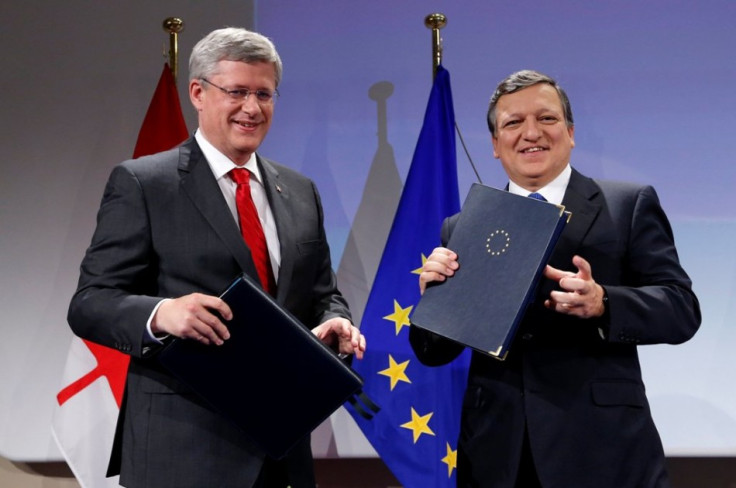EU Signs €26bn Free Trade Agreement with Canada

The European Union has struck a free trade deal with Canada, a move designed to boost growth and employment on both sides of the Atlantic.
The Comprehensive Economic and Trade Agreement (Ceta), which still requires approval by parliaments and EU member states, marked the end of over four years of negotiations.
Besides bringing almost all tariffs to zero, Ceta will liberalise trade in services, in particular financial services, telecommunications, energy and transport, the EU said in a statement.
All Canadian levels of government will open up their public procurement markets to European suppliers.
CETA will also bring the Canadian protection of intellectual property closer to the level of the EU, benefitting the pharmaceutical sector and exporters of agricultural products of specific geographical origin (GIs).
Once implemented, the agreement is expected to boost bilateral trade in goods and services by 23% or €26bn (£22bn, $35bn). The overall benefits of the agreement are expected to raise the level of the EU's annual GDP by about €12bn a year, according to the EU statement.
"[The trade agreement] will be the basis for gaining a strong foothold in the North American market and so provide a catalyst for growth and the creation of jobs in Europe," European Commission President Jose Manuel Barroso said in the statement.
Canadian Prime Minister Stephen Harper said Ceta is "the biggest [trade] deal [his] country has ever made".
"It will give Canada access to a market of some 500 million people in the EU, making it bigger even than the country's North American Free Trade Agreement signed with the US and Mexico," Harper added, reported BBC.
Two-Way Trade
In 2012 Canada was the EU's 12th most important trading partner, accounting for 1.8% of the EU's overall external trade.
Based on 2011 figures, the EU was Canada's second most important trading partner, trailing the US, representing 10.4% of Canada's total external trade.
Canada's Economic Woes
The Canadian economy has experienced an average quarterly growth rate of 1.3% since the beginning of 2012.
However, this is significantly lower than the 3% growth recorded in 2011 and 2010.
Exports, which have been contributing largely to the economy, have dropped 1.2% since the end of 2011.
The free trade agreement is expected to increase annual Canadian gross domestic product (GDP) by €8.2bn (£6.9bn, $11.2bn), according to a joint study released in 2008 by Canada and the European Commission.
That amount represented about 0.77% of the country's output in 2008.
© Copyright IBTimes 2025. All rights reserved.






















